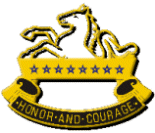DISPATCH 012--16 FEB 2007
The newly elected president, Franklin D. Roosevelt, and his wife decided to visit Supreme Court Justice Oliver Wendell Holmes on the occasion of his ninety-second birthday. The year was 1933, and already the storm clouds of war were appearing on the horizon of Europe. The President asked Mr. Holmes, a veteran of the Civil War, what advice he could give during these trying times. Mr. Holmes replied, “You’re in a war. I have been in a war. There is only one thing to do in war. Form your battalions, and carry the fight to the enemy.”
All of us, whether we are serving in Iraq or serving back at home to support our loved ones, are in a war. But, like with any war, we must be careful to clearly identify who the enemy is, how he will attack, and how we can fight back and conquer him. And as we are discovering over here, finding the enemy is proving to be more difficult than we first expected.
Who and where is the enemy back at home? Is it the friend who encourages you to do things you know would disappoint your spouse? Is it the loneliness coupled with fear that can tear at the fabric of good judgment? Is it the monotony of tasks, the repetitiveness of life that can easily plant seeds of doubt about commitment, purpose, and faithfulness?
Who is the enemy here in Iraq? There is a very real and determined enemy that is attacking and wants to kill us, but we face other enemies as well. Some are the same you face. We can become so focused on coping with what we have seen and done that we forget to nurture the ties between husband and wife, father and children.
The rabbis of Israel believed that the greatest sin they could commit would be to forget…to forget Who loved them and to Whom they belonged. In the busy-ness of life, in the fog of war, it would be easy to begin to forget the ones whom we really treasure.
But we have not forgotten. Every time I visit with a soldier and he begins to talk about his family, his eyes light up, and, through the muck and the grease that is ever-present on every face, a spark of hope burns for a future reunion. Every time I enter a Containerized Housing Unit (CHU) or other living space, crowded pictures of family, artwork from children, and other artifacts from home adorn the already cramped quarters.
The challenge for you and for us is that we live under the tyranny of the immediate, meaning we tend to react to where the pain and stress are now. As soldiers, we have become brothers. Whether it is 12 hours in a guard tower, 14 hours in the back of a Bradley, six days in a Humvee, or five terrifying minutes at the aid station, we have grown closer than blood relatives. The only word that I can begin to describe what I have witnessed is sacrament. Sacrament is the word the Church uses to describe the communication of God’s love to us. It also means sacred mystery. A sacramental relationship is one that, while being completely voluntary, is nonetheless stronger than genetic ties. We enter into a sacramental relationship with God when we are baptized. When we looked into your eyes on the day of our marriage, we entered into another sacramental relationship. We voluntarily chose you and you, us. And because of this deployment, because of the stresses and horrors of war, we have entered into another sacramental relationship, and this one is between us soldiers. In many ways, it can be just as powerful as baptism and marriage. For without each other, we could not make it through even one day—-mentally, physically, or spiritually.
The tyranny of the immediate calls us to focus almost all of our energy on the tasks at hand. It does not mean we love you any less. It means we do not and cannot let each other down. However, it is my most fervent prayer, and one I undoubtedly share with my fellow soldiers, that none of you reading this will be at my or any other soldier’s funeral. Why? Because, instead, we will have lived long, healthy, and productive, post-Army lives. The people who should and do matter to us today are the folks who will be at that funeral many years from now: our wives, our children, our siblings, our grandchildren, and our friends. Just because we might seem distracted by the present does not mean we do not see our future with you.
And we must remember that you are fighting your own battles at home. Bills that need to be paid, grass that needs cut, bottoms that need wiped, childcare that needs to be arranged, friends that need to be looked after, and maybe, just maybe, a little time for yourself: all these things also comprise your tyranny of the immediate. We need to remember that you still see our future with us.
Being a soldier or being married to one is not an easy task. It will define the lives of all of us. The question that only we as individuals and as couples can answer is "how?" Will our experience deepen our love and trust for one another, or will it expose the fractures that have always been there? My daily prayers always come back to the safety of our soldiers, the safety of their families, and the health and endurance of our relationships.
On Memorial Day, May 30th, 1884, Justice Holmes delivered a speech honoring the soldiers who had served and who had fallen. Two famous quotes came from his words:
“In our youths, our hearts were touched with fire.”
“We have shared the incommunicable experience of war. We felt, we still feel, the passion of life to its top.”
To these words I will add the words of the Apostle Paul:
“Do not be overcome by evil, but overcome evil with good.” Romans 12:21
Let us not let the doubts, the perceptions, and these tumultuous times shatter the sacramental relationships we have forged in our homes and in our lives. Let us remember the meaning of the word sacrament, that it is a way for God to communicate His love to us. As a mother holds the hand of a child going in for surgery, so does a soldier hold the hand of his brother as the sounds of beating rotors appear on the horizon. These relationships do not compete with one another; they bless and strengthen one another.
Every day when the light fades and I try to sleep, I am overwhelmed by the images I see of your loved ones. Every day it is easy for me to begin to lose my grasp on my Christian faith and instead seek vengeance and reprisal upon those who hurt our men. But every day as my eyes close I see your husbands, your sons, boys almost half my age, overcoming evil with good, and not letting the darkness of this war blot out their light and the goodness of their souls.
Another name for faith is fire, holy fire. Because of the faithfulness of your loved one and your family, my life, my heart, even in the midst of despair, was and is touched by the fire of faith, hope, and love.
Gratia et Veritas,
Chaplain Kevin Wainwright




